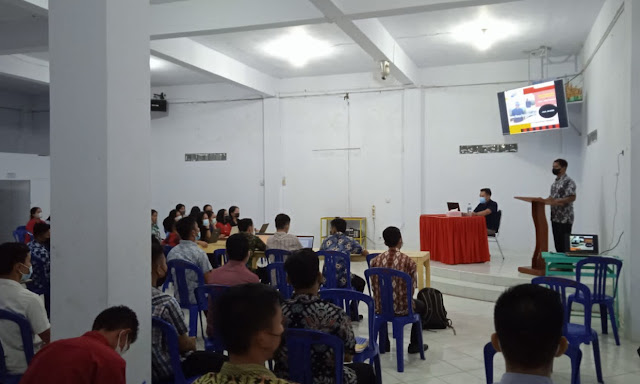By Arisman Laia.
I am
Arisman Laia, a third-semester student from the Arastamar Bengkulu Theological
College (STTAB). I participated the Stube-HEMAT Bengkulu activity on November
23, 2021, at 19.00-21.30 WIB in the STTAB Academic Hall with Masye Syaputa
Sibarani, S.Ak as the speaker, carrying a theme of ‘Democracy and Economy’ with
‘The Effect of Democracy on the Indonesian Economy’ as the sub-theme. There are
several notes from the activity.
Indonesia is a democratic country as stated in the 1945 Constitution, that authority is in the hands of the people. According to the source person, democracy is the freedom rights given to the people to express their aspirations in government. Democracy has characteristics, namely: first, it has people's representatives, for example, the House of Representative (DPR) and so on. Second, the decision is based on the aspiration and interest of citizens. Third, implement constitutional characteristics, fourth, hold general elections, and fifth, there is a party system. Democracy has a goal, that is, every person has freedom of opinion, create security and order for citizens, encourage people to be active in government, limit government power, and prevent disputes. So, democracy gives us space for discussion.
The word economy comes from the Greek word Ekonomia, which means household management. Economics is the study of unlimited human needs. The origin of the word is ‘Oikos’ which means family and ‘nomos’ which means rules, regulations, or laws. ‘Oikonomia’ is defined as the rule of society as a quadratic law that defines a good household. In economics there is such a thing as a motive, which is every reason, encouragement and activity carried out by a person or entity to take economic action. The purpose of the economic motive is to achieve prosperity. Everyone has a prosperous drive to do the economy. There are two economic motives, namely individual motive and group motive.
Economic principles are applied in three different activities, namely production, distribution, and consumption. Production talks about what we do. Distribution talks about the act of production. Consumption talks about who will receive it. The principle of economics involves three things, namely economical, efficient, and cost. The economic system is the procedure used in coordinating economic principles. Overall, there are four economic systems in the world, namely (1) traditional economic system, (2) command economic system, (3) liberal or market economic system, and (4) mixed economic system. Indonesia has a Pancasila economic system or a mixed system. The basis of this political economy is regulated in Article 33 of the 1945 Constitution.
So,
what is the impact of democracy to the Indonesian economy? There are negative
and positive impacts. The positive impact is that public participation
increases, implement an economic system, and state resources are used for the
benefit of the people. The state maintains the people of the 1945 Constitution,
article 34, and the government structure from the lowest level. The negative
impact is that social inequality is still too high, there are many different
economic motives, and the emergence of unfair competition. Democracy is a
system to achieve the goal of prosperity, so democracy and the economy have a
close correlation. (AL)



Comments
Post a Comment